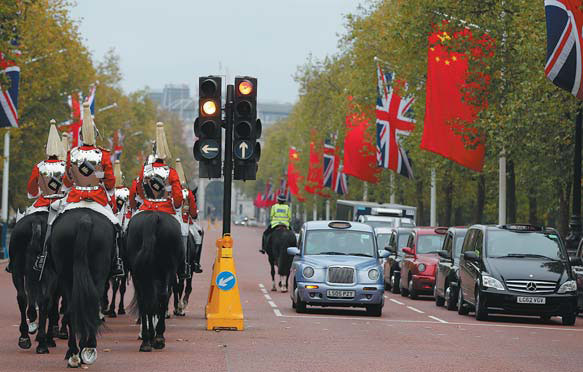Shared experiences can help work on environment
|
China's national flags are fixed on poles beside Union flags along The Mall towards Buckingham Palace as London gets prepared for the visit of Chinese President Xi Jinping, accompanied by his wife Peng Liyuan starting on Monday. Frank Augustein / AP |
With the Chinese President Xi Jinping visiting the United Kingdom from Oct 19 to 23, what can we expect to be the theme of the trip?
Given the recent trip to China by Chancellor of the Exchequer George Osborne you would expect to find economic and financial cooperation like choosing London for China's first overseas sovereign debt issue, signing off on deals like the Hinkley Point C Nuclear plant and possible involvement in high-speed rail on the agenda.
But there is also scope to share experiences about improving air quality and sustainable urban management, particularly in light of the meeting in Paris in December to tackle global climate change issues.
While Xi is traveling around London, he may want to check the impact of a congestion charge in reducing congestion and improving air quality, a very live issue in many cities of China. The introduction of a congestion charge in London in 2002 reduced the number of vehicles entering central London by 70,000 a day, producing real benefits for the city by not only cutting key traffic pollutants but also by improving public transport capacity and performance, and reducing traffic casualties.
Such an undertaking would be on top of the outstanding investment already carried out by the authorities, and would be consistent with the Chinese government's focus on people-centred and scientific methods of development.
In the urban management of London, we are dealing with the environmental pressures of London's growth. Here we are talking about London growing to between 9.5 to 13 million by 2050 but in comparison to China, where we have seen over 500 million move from villages to the cities, we have a lot to learn from China as it meets the huge water management, green infrastructure and climate resilience challenges. For example, its huge investment in renewable energy and initiative in carbon taxes are things we can learn from, not just in London but also the whole of the United Kingdom.
China deserves a lot of credit for its renewable energy effort, as it is now spending as much on clean power as the United States and Europe put together. As a result, they now have the largest wind power market in the world, and its commitment to renewable energy has benefited the rest of the world by creating a mass market that prompted a 70 percent reduction in the cost of solar panels in recent years. Such a wealth of experience in renewable and clean energy would certainly help London build the green infrastructure for a bigger city.
Furthermore, its proposal for a nationwide carbon-trading scheme, to be set up in 2017, is the most visible example of a broader trend in China toward using market mechanisms in environmental matters when most countries promulgate regulations as their main green policy tool. The Chinese experience on this front, would give the UK another opportunity to look again at market based system allowing economic levers to play a greater role in environmental governance.
So extending the theme of the environment to the presidential visit on issues like urban management and poor air quality would certainly be useful, particularly in light of the forthcoming climate summit in Paris. It will not only make for better understanding between China and the UK but also between the developed world and developing world in Paris for a better global agreement on climate resilience.
The author is deputy chair of the Environment Committee, London Assembly.
(China Daily 10/22/2015 page19)















